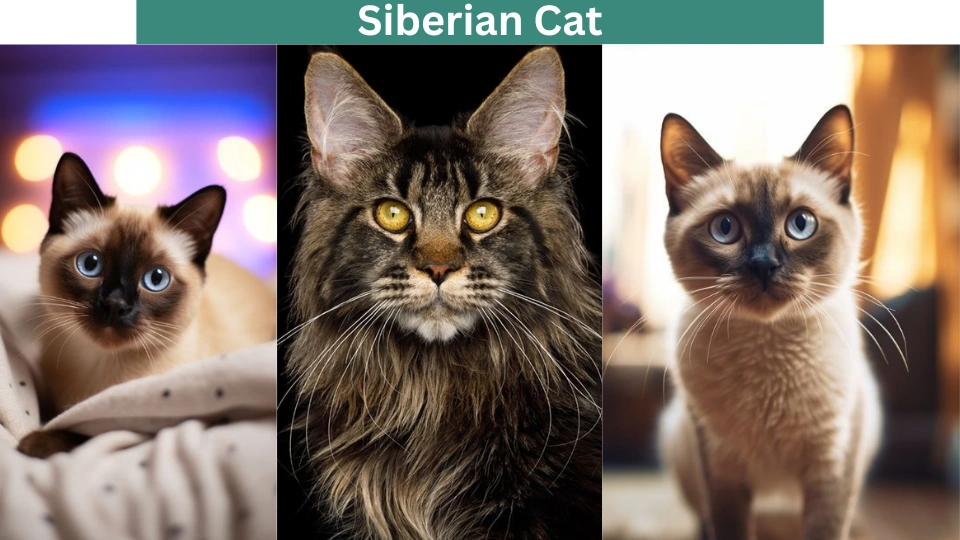Last Updated on March 17, 2024 by Aftab Tariq
The Siberian cat is a domestic breed known for its striking appearance, robust build, and affectionate nature. The Siberian cat is a very old and beautiful type of cat that comes from Russia. It’s a cat that lives in forests and has three layers of fur to keep it warm in cold weather.
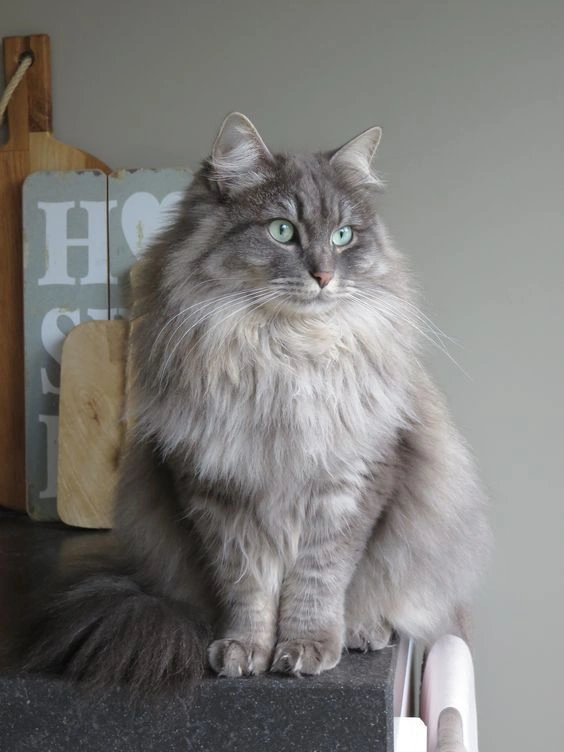
These fluffy cats are friendly and loving, so they’re great pets. They like being around other cats and dogs and enjoy playing with nice kids. If you can care for their grooming, a Siberian cat can be a wonderful part of your family. Here, we will discuss Siberian cats.
What Is A Siberian Cat?
Siberian cats come from Russia and have lived there for over 1,000 years. They’re sometimes called Siberian forest cats because they live in the forests. In Russia, where it’s very cold and snowy, these cats have thick fur and fluffy tails to stay warm.
Even though Siberian cats have been around for a long time, they only came to the United States in the 1990s. Since then, people have liked them. Some people think that other long haired cats are related to Siberian cats.
Siberian cats are not small; they have medium to large bodies that are strong and muscular. They usually weigh between 15 to 20 pounds and can be 17 to 25 inches long. Siberian kittens take a long time to grow; they’re fully grown at about five. Healthy siberian cat lifespan is between 12 to 15 years.
Things To Know About Siberian Cat Behavior
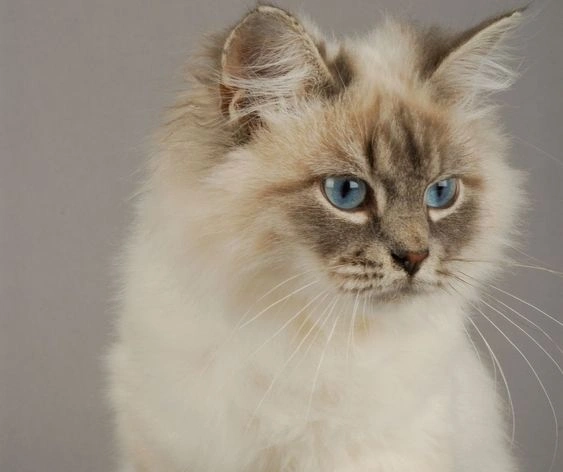
1: Siberian cats are national treasures in Russia, having been there for over a thousand years.
2: Siberian cats share some personality qualities, including being friendly, loud, lively, adaptive, and bold.
3: Siberian cats have a triple layered coat, which should be brushed at least twice a week to keep it lustrous and free of knots.
4: Siberians demand high quality food—a protein rich diet to fuel their energetic bodies.
Siberian Cat Appearance
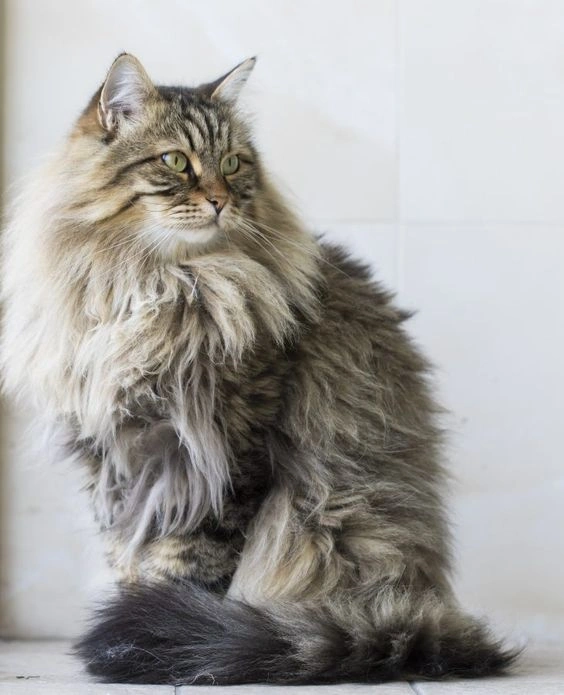
Siberian cats have a thick coat in shades like grey, orange, black, and more. Their fur can be different lengths and textures depending on their family.
In winter, Siberian cats grow a thick coat to keep warm, but it’s less thick in summer. Their fur can be a mix of colours, like patches of different shades or stripes.
A Siberian might be a good choice if you’re allergic to cats because they’re considered hypoallergenic, although they still shed a bit.
Siberian cats have big paws and tall, pointy ears. They look a bit like other breeds, such as Norwegian forest cats, Maine coons, and Balinese cats.
Their eyes are round and can be green, copper, golden, or blue. Sometimes, their eyes are different colours.
Siberian Cat Personality
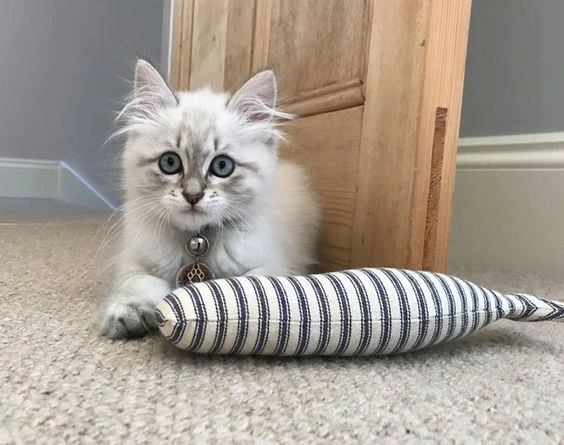
The personality of your Siberian cat can vary depending on how they are raised, as not all cats are the same. For instance, a cat that has been around children and other pets from an early age will usually feel more at ease in these situations.
This breed has similar personality features, even if each cat is as different as its owners. A few of them can be seen here.
1: Affectionate And Friendly
Siberian cats have a cool background, living in the forests of cold places. But now, they’re loving pets who care about their owners. They enjoy snuggling and sitting on your lap, and they’ll even follow you around and greet you when you come home.
Even though they’re very loving, they’re not too clingy. If a Siberian cat grows up with kids and other pets, they become great buddies. They’re not usually shy with new people and can live happily in different homes. If your cat isn’t as cuddly as you’d like, you can try a few things to encourage it:
1: Pick the right time: Make sure your cat is in a good mood before trying to cuddle. If they’re hungry or alert, they might not be interested.
2: Get down low: Cats feel safer if you meet them at their level, so crouch down when you want to pet them.
3: Pick them up gently: If your cat is okay with being picked up, do it gently, supporting their body with both hands.
4: Get cosy: Find a comfy spot and hold your cat close. They might want to see your face. If they start to wiggle, let them go and try again later.
2: Playful
Siberian cats take their time growing up, staying playful until they’re about five. They love to explore and play, but they’re not usually destructive. Still, having a scratching post for them to sharpen their claws is a good idea.
Even though they’re playful, they have a medium energy level, so they’ll also enjoy relaxing with you. Siberian cats are great at catching mice and are handy for pest control.
To keep your Siberian cat entertained, spend some time each day playing with them. They’ll have fun chasing feather toys and lights. Having a cat tree will also keep them happy when you’re not home.
3: Vocal
Siberian cats like to express themselves with their voice. Your cat will let you know when they’re hungry or in pain, and they might even chat a lot when you come home after being away.
These smart cats remember how you react to their meows. If you give them what they want when they make noise, they’ll keep doing it.
Siberian cats are also big purrers. When they’re happy and content, you’ll hear their gentle purring. So, expect your kitty’s purr to start up when you cuddle with them!
4: Bold
Siberian cats are usually very self assured and relaxed. They’re not easily intimidated and are often friendly and attentive to their owners’ feelings.
If there’s a visitor or a strange noise, your bold cat might go to check it out instead of hiding away.
Your cat will be loyal and affectionate but also enjoy their independence. If they have toys and a cosy spot to nap, you can leave them alone at home during the day without worry.
5: Adaptable
Siberian cats are known for their adaptability. As long as they’re with their favourite people, they’re happy wherever they are.
They’re quick to adjust to new family members, whether a baby, a new partner, or another pet. These cats aren’t easily startled, so even if your home is bustling with noisy kids, your Siberian cat will usually handle it just fine.
Grooming For Siberian Cat
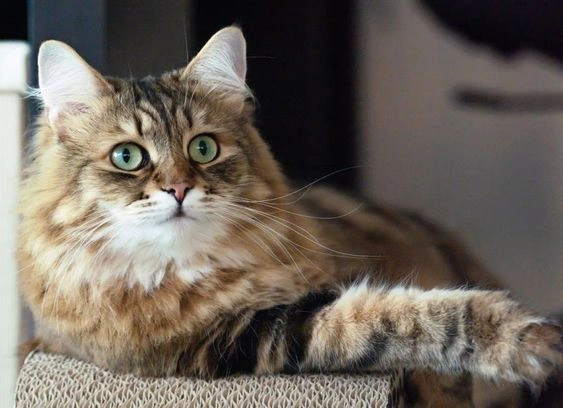
Siberian cats have thick fur but only shed a lot of hair twice a year. The rest of the time, they don’t shed much. They lose hair in spring and fall to prepare for warm and cold weather.
To keep your Siberian cat’s fur from getting tangled, brush it at least two times a week. This breed usually doesn’t mind water, so bathing them once a month could be okay.
It would help to trim your Siberian cat’s nails every two weeks. If you need help with how to do it, ask your vet.
Taking care of your Siberian cat’s teeth is important, too. Brush them twice a week, and take your cat for a checkup once a year. This helps prevent dental problems. Clean your cat’s ears every week to remove any wax or dirt.
How Much Space Does A Siberian Cat Need?
Siberian cats need to play and exercise daily, especially when young. But unlike dogs, they can stay active inside your home. If you live in a small place like an apartment, make sure your cat has toys and playtime to keep them happy.
Keeping your cat indoors has its advantages. It keeps them safe from cars and other animals that might hurt them and protects birds and animals from being hunted by your cat.
If you have a backyard and want your Siberian cat to go outside, consider getting an outdoor enclosure like a “catio.” It gives your cat a taste of the outdoors without any dangers.
Siberian Cat Food
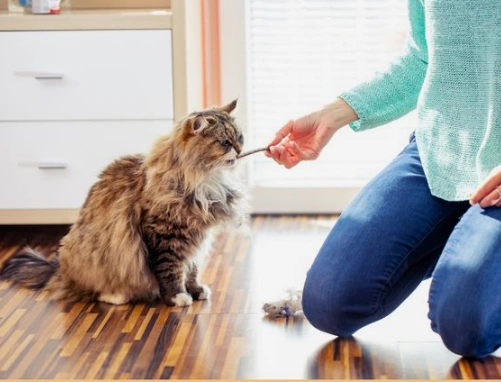
Siberian cats need a diet rich in meat because they are obligate carnivores. Look for cat food with lots of protein, like beef, lamb, or chicken. You can also give them fish once a week.
Feed your Siberian cat wet cat food twice daily in the morning and evening. Always ensure they have fresh water, especially if you give them dry kibble instead of wet food.
The amount of food your Siberian cat needs depends on their age, weight, and how active they are. Male cats are usually bigger than females, so they might need more food to stay healthy.
If you get your cat from a breeder, ask them for advice on what to feed your cat. You can also talk to your vet for help.
Cats can have sensitive stomachs, so there are some foods you should avoid giving them. These include milk, onions, garlic, chocolate, and grapes.
Siberian Cat Health Issues
Siberian cats are usually healthy, but it’s important to take them to the vet once a year for a checkup. This helps catch any problems early.
One common health issue in this breed is hypertrophic cardiomyopathy (HCM), a heart disease. As they get older, they might also be at risk of urinary tract disease, polycystic kidney disease, diabetes, and cancer.
If you adopt a kitten, follow a vaccination schedule starting at six weeks old. These vaccines protect your cat from serious illnesses like rabies, feline viral rhinotracheitis, and feline leukaemia virus.
Periodontal disease, or gum disease, is also a concern for cats. Regular teeth brushing and yearly dental checkups can keep your cat’s mouth healthy.
Which Kind Of Owner Is Ideal For A Siberian Cat?
Siberian cats are social and love companionship. They’re happiest with owners who can spend time with them.
Although they can be alone during the day while you’re at work, leaving them alone for more than 24 hours is good; if you’re away longer, ask someone to check on them or consider boarding them.
Siberian cats can live in homes of any size. They’re usually good with children and get along well with dogs and other pets.
Frequently Asked Questions
Are Siberian Felines Pricy?
Siberian kittens can range in price from $1,200 to $4,000, contingent on age and lineage.
What Is Siberian Cat Size?
The average Siberian cat is between 23 and 28 cm tall overall, with a body length of 38 to 46 cm.
Are Siberian Felines Unique?
You should learn that saying immediately if you haven’t met a Siberian cat before to tell how amazing they are to the first one you meet. Though powerful and incredibly intelligent, these gentle giants have a sweetheart and get along with almost everyone, including pets.
Do Siberian Cats Have Voices?
Siberians are not known for being extremely talkative cats, but they like to purr and make cute tiny meows, and other cat sounds to let you know what’s happening. Upon returning home, your Siberian cat will likely have much to say if you have been out all day.
Source
About the Siberian: The Cat Fanciers’ Association
Siberian Breed; The International Cat Association
Pet Allergy: Are You Allergic to Dogs or Cats?
Hypertrophic Cardiomyopathy. Cornell Feline Health Center.
I am a dedicated content writer with more than five years of experience, particularly skilled in the art of storytelling. My writing journey commenced during my college years, where I pursued journalism and unearthed my talent for creating captivating narratives.

